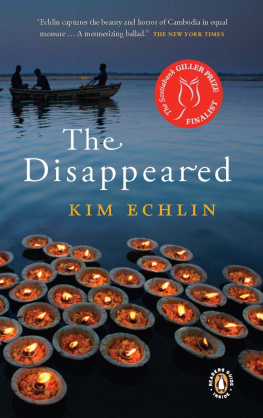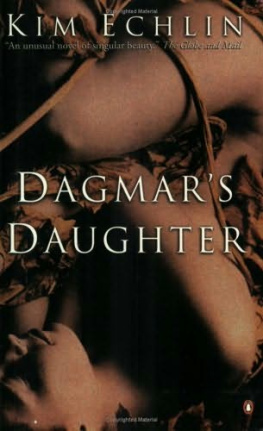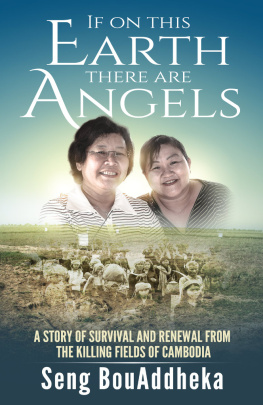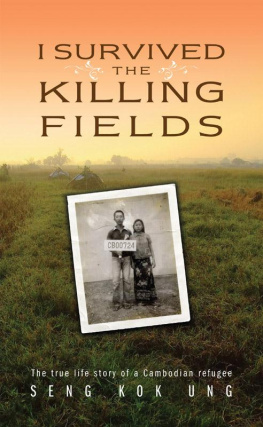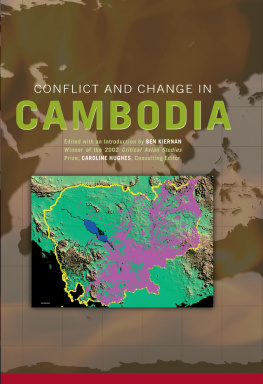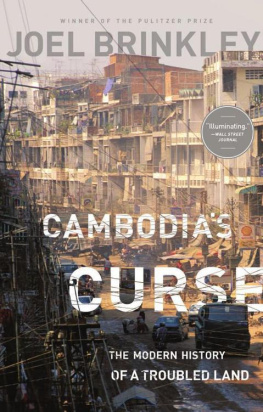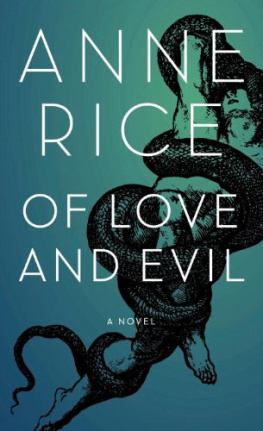ACKNOWLEDGMENTS
My reading about Cambodias and other countries genocides and truth commissions, and survivors and perpetrators reflections, is woven through the fabric of this story. The responsibility for this story, however, is mine, and all allusions to other writers reflections and witness accounts have been transmuted here into the kind of truth that fiction tells.
I would like to acknowledge the support of a McGeachy Scholarship from the United Church of Canada.
I am especially grateful for the work of Youk Chaang at the Documentation Center of Cambodia (DC-Cam); Brad Adams and Human Rights Watch; Mark Gergis and his music collection; Rich Garella and Eric Papes article A Tragedy of No Importance; Kathy Gruspier for conversation and field notes from the Ontario coroners team; Kim Kieran for her diaries (unpublished); for photographs and the most generous consulting, Sonia Tahieri, Ton Paeng and Robert Fiala; Craig Etcheson; research from DC-Cam and the report Documentation Center of Cambodia Forensic Project and Yale Universitys Cambodian Genocide Data Bases.
Readers who love Buddy Guy, Etta James and Sophocles Antigone may hear echoes of their song and poetry. Truth is as old as God ... / And will endure as long as He, A Co-Eternity (). Tzvetan Todorov wrote in Facing the Extreme: Moral Life in the Concentration Camps, There is, however, no necessary correlation between how we tell of the past and how we use it; that it is our moral obligation to reconstruct the past does not mean that all the uses we make of it are equally legitimate.
Others I would like to thank are Lin Chear, Debby deGroot, Shaun Oakey, David Ross, Elizabeth Schmitz, Sally Reardon, Cheryl Carter, Paulette Blanchette, Anne Simpson, Alex Levin, Barbara Jackman, Janice Blackburn, Peter Jacobsen, Rory Cummings, The Very Reverend Bruce McLeod, the late Dr. and Mrs. N.K. Campbell, Ian Small, Michelle Oser, Linda Gaboriau and the Banff Centre for the Arts, Monica Pereschi, Josephine Rijnaarts, Manfred Allie, the Khmer Buddhist Centre of Ontario, Leslie and Alan Nickell, Adam and Ann Winterton, Madeleine Echlin, Paul Echlin, Randy and Ann Echlin, Mark and Joanne Echlin.
To Ross Upshur, true gratitude for your insights and discussion, for sharing with me the dailiness of writing. To Olivia and Sara Upshur, thank you for daily joy.
A special thank you to Sandra Campbell for invaluable criticism and inspiration over many years. You have seen this story in a thousand lights.
To David Davidar and Nicole Winstanley, thank you for your talent, editorial imagination and risk-taking. You are true well-jumpers.
And thank you to a woman whose name I never learned. In a Phnom Penh market you broke silence and asked me to remember with you.
I imagine us in a place that could forgive us all.
1
Mau was a small man with a scar across his left cheek. I chose him at the Russian market from a crowd of drivers with soliciting eyes. They drove bicycles and tuk tuks, rickshaws and motos. A few had cars. They pushed in against me, trying to gain my eye, to separate me from the crowd.
The light in Maus eyes was a pinprick through black paper. He assessed and calculated. I chose him because when he stepped forward, the others fell back. I told him it might take many nights. I told him I needed to go to all the nightclubs of Phnom Penh. The light of his eyes twisted into mine. When I told him what I was doing, the pinprick opened and closed over a fleeting compassion. Then he named his price, which was high, and said, I can help you, borng srei.
Bones work their way to the surface. Thirty years have passed since that day in the market in Phnom Penh. I still hear your voice. I first met you in old Montreal at Lair du temps, where I went to hear Buddy Guy sing I Cant Quit the Blues. I was sixteen, and it was Halloween night. Charlotte and her friends did not wear costumes, but I used the occasion to disguise my age by putting on a shiny red eye mask decorated at the temples with yellow and purple feathers. My long kinked hair was loose and I wore a ribbed black sweater, my widest jeans, leather boots. As soon as we were past the doorman, I pulled off my mask and I saw you looking at me. We took a round table close to the stage in the smoke-filled room. All through the first set I rolled cigarettes and passed them to the girls at my table and listened to Buddy Guy pleading the blues, eyebrows way up, eyes wide open, singing Stone Crazy and No Lie, then squeezing his eyes shut he sang about homely-girl-love and begging-for-it-love, and I kept glancing over to see if you were looking at me.
I did not avoid your mud dark eyes. Between sets you stood, lifted your chair above your head and walked through the crowd toward me. You were slim and wiry and you wore a white T-shirt and faded jeans and your black hair was tied back at the nape of your neck. Your leather jacket was scuffed and your runners worn. You shifted sideways to let a tray go by and you said to the girls at my table, Can I join you? I brought my own seat.
The girls looked at each other and someone said yes and you put your chair in beside me, its back against the table. Charlotte said, You play in No Exit, Ive seen you at the pub. Whats your name?
Serey.
They poured you a beer from the pitcher and you talked in your soft voice to all of us. Asked, What are you studying? When you turned to me I had to say, Im still in high school.
Charlotte said, Im her Latin tutor. Her name is Anne Greves. You asked, Is Latin difficult? A girl across the table liked you and she said, I study Latin. You said you tutored math at the university. Said youd seen them around, but not me.
Charlotte said, Her father teaches there and she doesnt want to be seen.
You smiled again and your front tooth had a half-moon chip and you said, Cool, in a strange accent of Quebec and English and something else I could not place.
The house lights went down. You leaned close and whispered, I want to touch your hair.
I did not say no or yes, but I felt the warm pressure of your palm against my skull. Then you put your elbows on the back of your chair.
You spoke with the mix of interest and inattention I was familiar with in men. Your excited eyes flickered to the stage, to the table you came from, to me. You wanted to know who was watching you. You wanted to see Buddy Guy and the horns and guitars up front. You wanted to watch me.
Years later you said, I remember watching you roll cigarettes with one hand. Fidgeting when the girls at your table talked. You seemed so free. I remember the light in your hair.
It was a time when young people from everywhere were driving Volkswagen buses through the mountains of Afghanistan and chanting in ashrams in India. But boys like you were not hippies or peaceniks or backpackers; colonized boys like you had always been sent abroad to study. You had been away for six years and you had learned to be at home in three languages, to navigate the manners and peculiarities of the West. Your education was mathematics and rock music. You knew functions and relations and your musician friends sang against war and had love-ins for peace. It was a time when young people believed the world could be borderless, like music. All this was naive, looking back. You were five years older, and you spoke a language I had never heard. And there was that animal feeling, the smell of your leather jacket, the quiver in my stomach, Buddy Guys voice and your breath on my ear.
Years later you said, Do you remember in those days, the shock of an Asian guy with a white girl, or a black with white, or a French with English, all of us pretending nothing was forbidden? I never had the courage to ask a white girl until you, that night at Lair du temps.
Buddy Guy walked out for the last set in a green jacket that he took off while he played, hammering and pulling and bending strings with his left hand as he shook the right arm free, his right-hand fingers plucking and picking so he could shake off the left sleeve. His jacket fell to the floor and he grinned out at us when we clapped at his clowning. His mother had died that year and he said he was going to get a polka dot guitar in her honor but he did not have it yet. He played sounds he had heard other places and other times, horns and fiddles, concocting a New Orleans gumbo, a little of this, a little of that, paying homage to Muddy and B.B. and Junior. And then he got down to his own work. He sang about Lord-have-mercy-blues in One Room Country Shack and impatient love in Just Playing My Axe, and with that great big charming smile he sang Mary Had a Little Lamb, and about asking for a nickel from an angel and about strange feelings and broken hearts and, with a shake of his head, about women he could not please but we all knew he could please anyone, and I wished the lights would never come up. You put your muscled arm around my shoulder and pulled me close and you asked in a soft, soft voice, Can I take you home? A few people were dancing on the sides and you took my hand and pulled me up to dance too and you could sway at the hips but you had this way of moving your hands that was not rock and roll and not the blues but a small graceful bend backward in your wrist at the end of a beat.

